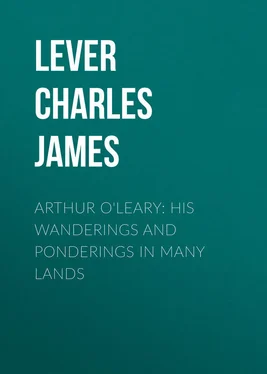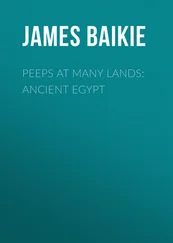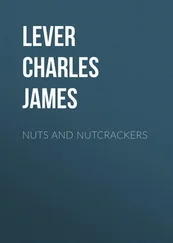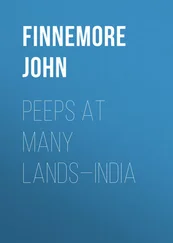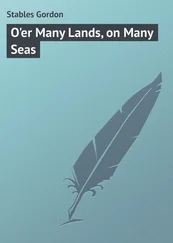Charles Lever - Arthur O'Leary - His Wanderings And Ponderings In Many Lands
Здесь есть возможность читать онлайн «Charles Lever - Arthur O'Leary - His Wanderings And Ponderings In Many Lands» — ознакомительный отрывок электронной книги совершенно бесплатно, а после прочтения отрывка купить полную версию. В некоторых случаях можно слушать аудио, скачать через торрент в формате fb2 и присутствует краткое содержание. Издательство: Иностранный паблик, Жанр: literature_19, foreign_antique, foreign_prose, на английском языке. Описание произведения, (предисловие) а так же отзывы посетителей доступны на портале библиотеки ЛибКат.
- Название:Arthur O'Leary: His Wanderings And Ponderings In Many Lands
- Автор:
- Издательство:Иностранный паблик
- Жанр:
- Год:неизвестен
- ISBN:нет данных
- Рейтинг книги:3 / 5. Голосов: 1
-
Избранное:Добавить в избранное
- Отзывы:
-
Ваша оценка:
- 60
- 1
- 2
- 3
- 4
- 5
Arthur O'Leary: His Wanderings And Ponderings In Many Lands: краткое содержание, описание и аннотация
Предлагаем к чтению аннотацию, описание, краткое содержание или предисловие (зависит от того, что написал сам автор книги «Arthur O'Leary: His Wanderings And Ponderings In Many Lands»). Если вы не нашли необходимую информацию о книге — напишите в комментариях, мы постараемся отыскать её.
Arthur O'Leary: His Wanderings And Ponderings In Many Lands — читать онлайн ознакомительный отрывок
Ниже представлен текст книги, разбитый по страницам. Система сохранения места последней прочитанной страницы, позволяет с удобством читать онлайн бесплатно книгу «Arthur O'Leary: His Wanderings And Ponderings In Many Lands», без необходимости каждый раз заново искать на чём Вы остановились. Поставьте закладку, и сможете в любой момент перейти на страницу, на которой закончили чтение.
Интервал:
Закладка:
“What’s all this?” said we.
“These,” said he, “are really ‘The Loiterings of Arthur O’Leary.’ Listen to this. Here’s a bit of Goldsmith for you —
“‘I was born of poor but respectable parents in the county – .’ What are you laughing at? Is it because I did’nt open with – ‘The sun was setting, on the 25th of June, in the year 1763, as two travellers were seen,’ &c., &c,? Eh? That’s your way, not mine. A London fellow told me that my papers were worth five hundred pounds. Come, that’s what I call something. Now I’ll go over to the ‘Row.’”
“Stop a bit. Here seems something strange about the King of Holland.”
“You mustn’t read them, though. No, no. That’ll never do – no, Hal; no plagiarism. But, after all, I have been a little hasty with you, Perhaps I ought not to have burned that thing; you were not to know it was bad.”
“Eh! how?”
“Why, I say, you might not see how absurd it was; so here’s your health, Hal: either that tankard has been drugged, or a strange change has come over my feelings. Harry Lorrequer, I’ll make your fortune, or rather your son’s, for you are a wasteful creature, and will spend the proceeds as fast as you get them; but the everlastingly-called-for new editions will keep him in cash all his life. I’ll give you that box and its contents; yes, I repeat it, it is yours. I see you are overpowered; there, taste the pewter and you’ll get better presently. In that you’ll find – a little irregular and carelessly-written perhaps – the sum of my experience and knowledge of life – all my correspondence, all my private notes, my opinions on literature, fine arts, politics, and the drama.”
But we will not follow our friend into the soaring realms of his imaginative flight, for it was quite evident that the tankard and the tobacco were alone responsible for the lofty promises of his production. In plain English, Mr. O’Leary was fuddled, and the only intelligible part of his discourse was, an assurance that his papers were entirely at our service; and that, as in some three weeks time, he hoped to be in Africa, having promised to spend the Christmas with Abd-el-Kader, we were left his sole literary executor, with full power to edit him in any shape it might please us, lopping, cutting, omitting – anything, even to adding, or interpolating.
Such were his last orders, and having given them, Mr. O’Leary refilled his pipe, closed his eyes, stretched out his legs to their fullest extent, and although he continued at long intervals to evolve a blue curl of smoke from the corner of his mouth, it was evident he was lost in the land of dreams.
In two hours afterwards we were on our way back to Dublin, bearing with us the oaken box, which, however, it is but justice to ourselves to say, we felt as a sad exchange for our own carefully-written manuscript. On reaching home, our first care was to examine these papers, and see if anything could be made of them, which might prove readable; unfortunately, however, the mass consisted of brief memoranda, setting forth how many miles Mr. O’Leary had walked on a certain day in the November of 1803, and how he had supped on camel’s milk with an amiable family of Bedouins, who had just robbed a caravan in the desert. His correspondence, was for the most part an angry one with washerwomen and hotel-keepers, and some rather curious hieroglyphic replies to dinner invitations from certain people of rank in the Sandwich Islands. Occasionally, however, we chanced on little bits of narrative, fragments of stories, some of which his fellow-travellers had contributed, and brief sketches of places and people that were rather amusing; but so disjointed, broken up, and unconnected were they all, it was almost impossible to give them anything like an arrangement, much less anything like consecutive interest.
All that lay in our power was to select from the whole, certain portions, which, from their length, promised more of care than the mere fragments about them, and present them to our readers with this brief notice of the mode in which we obtained them – our only excuse for a most irregular and unprecedented liberty in the practice of literature. With this apology for the incompleteness and abruptness of “the O’Leary Papers” – which happily we are enabled to make freely, as our friend Arthur has taken his departure – we offer them to our readers, only adding, that in proof of their genuine origin, the manuscript can be seen by any one so desiring it, on application to our publishers; while, for all their follies, faults, and inaccuracies, we desire to plead our irresponsibility, as freely, as we wish to attribute any favour the world may show them, to their real author: and with this last assurance, we beg to remain, your ever devoted and obedient servant,
CHAPTER I. THE “ATTWOOD.”
Old Woodcock says, that if Providence had not made him a Justice of the Peace, he’d have been a vagabond himself. No such kind interference prevailed in my case. I was a vagabond from my cradle. I never could be sent to school, alone, like other children – they always had to see me there safe, and fetch me back again. The rambling bump monopolized my whole head. I’m sure my god-father must have been the wandering Jew, or a king’s messenger. Here I am again, en route , and sorely puzzled to know whither? There’s the fellow for my trunk.
“What packet, sir?”
“Eh? What packet? The vessel at the Tower stairs?”
“Yes, sir; there are two with the steam up, the Rotterdam and the Hamburgh.”
“Which goes first?”
“Why, I think the Attwood, sir.”
“Well, then, shove aboard the Attwood. Where is she for?”
“She’s for Rotterdam. – He’s a queer cove too,” said the fellow under his teeth, as he moved out of the room, “and don’t seem to care where he goes.”
A capital lesson in life may be learned from the few moments preceding departure from an inn. The surly waiter that always said “coming” when he was leaving the room, and never came, now grown smiling and smirking; the landlord expressing a hope to see you again, while he watches your upthrown eyebrows at the exorbitancy of his bill: the boots attentively looking from your feet to your face, and back again; the housemaid passing and repassing a dozen times, on her way, no where, with a look half saucy, half shy; the landlord’s son, an abortion of two feet high, a kind of family chief remembrancer, that sits on a high stool in the bar, and always detects something you have had, that was not “put down in the bill” – two shillings for a cab, or a “brandy and water;” a curse upon them all; this poll-tax upon travellers is utter ruin; your bill, compared to its dependencies, is but Falstaffs “pennyworth of bread,” to all the score for sack.
Well, here I am at last. “Take care I say! you’ll upset us. Shove off, Bill; ship your oar,” splash, splash. “Bear a hand. What a noise, they make,” bang, crash, buzz; what a crowd of men in pilot coats and caps; women in plaid shawls and big reticules, band-boxes, bags, and babies, and what higgling for sixpences with the wherrymen.
All the places round the companion are taken by pale ladies in black silk, with a thin man in spectacles beside them; the deck is littered with luggage, and little groups seated thereon; some very strange young gentlemen with many-coloured waistcoats are going to Greenwich, and one as far as Margate; a widow and daughters, rather prettyish girls, for Herne Bay; a thin, bilious-looking man of about fifty, with four outside coats, and a bearskin round his legs, reading beside the wheel, occasionally taking a sly look at the new arrivals. – I’ve seen him before; he is the Secretary of Embassy at Constantinople; and here’s a jolly-looking, rosy-cheeked fellow, with a fat florid face, and two dashing-looking girls in black velvet. Eh! who’s this? Sir Peter, the steward calls him; a London Alderman going up the Rhine for two months – he’s got his courier, and a strong carriage, with the springs well corded for the pavé ; – but they come too fast for counting: so now I’ll have a look after my berth.
Читать дальшеИнтервал:
Закладка:
Похожие книги на «Arthur O'Leary: His Wanderings And Ponderings In Many Lands»
Представляем Вашему вниманию похожие книги на «Arthur O'Leary: His Wanderings And Ponderings In Many Lands» списком для выбора. Мы отобрали схожую по названию и смыслу литературу в надежде предоставить читателям больше вариантов отыскать новые, интересные, ещё непрочитанные произведения.
Обсуждение, отзывы о книге «Arthur O'Leary: His Wanderings And Ponderings In Many Lands» и просто собственные мнения читателей. Оставьте ваши комментарии, напишите, что Вы думаете о произведении, его смысле или главных героях. Укажите что конкретно понравилось, а что нет, и почему Вы так считаете.
